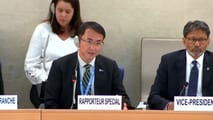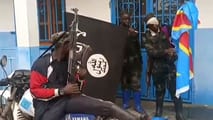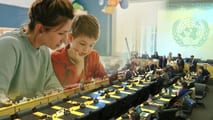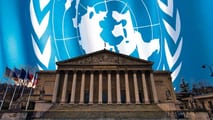ECLJ participates to the International Conference on “Freedom of Faith: The Problem of Discrimination and Persecution of Christians” organized by Moscow Patriarchate.
On November 30 and December 1, 2011, the Moscow Patriarchate organized a conference on  the problem of discrimination and persecution against Christians at Danilovskaya Hotel in Moscow. Twenty participants were invited to take part in the works of the conference, among whom high representatives of Orthodox Churches, Roman Catholic Church, Maronite Church, Armenian Apostolic Church, Assyrian Church of the East, Muslim and Jewish communities and the international and inter-Christian Interreligious and public organizations[1].
the problem of discrimination and persecution against Christians at Danilovskaya Hotel in Moscow. Twenty participants were invited to take part in the works of the conference, among whom high representatives of Orthodox Churches, Roman Catholic Church, Maronite Church, Armenian Apostolic Church, Assyrian Church of the East, Muslim and Jewish communities and the international and inter-Christian Interreligious and public organizations[1].
Dr. Grégor Puppinck, director of the ECLJ, was invited to attend the conference and to speak on the joint actions for protecting the rights of Christians: Parliamentary Assembly of the Council of Europe McCafferty resolution on the conscientious objection of medical staff and institutions (October 8, 2010), Parliamentary Assembly of the Council of Europe resolution and the recommendation on the persecuted oriental Christians (January 27, 2011) and Lautsi v. Italy case, better known as the Crucifix Case (judgment of the Grand Chamber of the European Court of Human Rights, March 18, 2011). As Dr. Puppinck could not attend the conference for medical reasons, Ms. Andreea Popescu, lawyer at ECLJ, was present and delivered a speech on his behalf, presenting some of the successful joint actions at the Council of Europe, which are the result of the in-depth and common work of Christians. She also mentioned how we can cooperate in the future at the Council of Europe, an example of such cooperation being the organization of a conference in Strasbourg on "the spiritual and moral values which are the common heritage of European peoples and the true source of individual freedom, political liberty and the rule of law, principles which form the basis of all genuine democracy" (Preamble of the Statute of the Council of Europe).
The conference was organized in the context of the recent awareness raised by international organizations on the persecution of Christians, other conferences being held and legal documents adopted on the topic, such as: the UN Conference in Geneva on fight against racism and xenophobia (April 2009), OSCE forum in Vienna on "freedom of religion or belief" (December 9-10, 2010), European Parliament's Resolution on "the situation of Christians in the light of the defense of freedom of religion" (January 20, 2011), Parliamentary Assembly of the Council of Europe's Recommendation on "violence against Christians in the Middle East" (January 25, 2011), seminary in European Parliament in Brussels on issue related to Christianophobia (March 16, 2011) and OSCE meeting in Rome on prevention of hate crimes against Christians (September 12, 2011). The session in Moscow was opened by Metropolitan Hilarion of Volokolamsk chairman of the Moscow Patriarchate's Department of External Church Relations, Archbishop Joseph Ender, representative of the Holy See, Mr. Massimo Introvigne, representative of the OSCE on combating racism, xenophobia and discrimination against Christians and members of other religions.
Metropolitan Hilarion presented how Christians are persecuted, especially in some African, Middle East and Asian countries, where they are not allowed to open churches, they face insecurity, are deprived of medical aid, have no right to become civil servants, they are put in prison for having a Bible or are exiled. Churches are transformed in mosques or explode, their property is confiscated and the clergy is reduced or imprisoned. Laws on blasphemy are abusively applied. He indicated the causes of this persecution: extremism and hate ideology in the Muslim countries, aggressive missionary practices of Evangelical Churches in Africa to convert Muslims into Christians, economic and political interests, Europe's refusal of its Christian identity and the secularization process in Europe which influenced the Europeans in living their lives according to consumerism rules, rather than with Evangelical values. He suggested the creation of permanent centers for collection and study of data related to religious persecution and the trial of every act of persecution against Christians.
Laura Lasserre, president of the UN Council of Human Rights, in a video conference with the participants, underlined that freedom of conscience and religion are fundamental rights and therefore means should be sought to guarantee the mutual comprehension and tolerance in order to avoid violence and discrimination against Christians.
Bishop Erwin Joseph Ender, representative of the Holy See in Moscow, drew the attention on the fact that even today, in Europe, where the freedom of religion is guaranteed, Christians are discriminated and excluded from the public life because of their faith: He explained the genuine meaning of "freedom of religion", recalling what the Pope Benedict XVI said on this matter on various occasions:
- Freedom of religion touches the constitutive dimension of man; it should not be limited to the freedom to worship, but it should also cover the freedom to preach, educate, convert and fully participate in public life;
- Freedom of religion is not synonymous with the relativistic or with the modern and post-modern thinking which consider religion as something non-important or marginal to public life. Freedom of conscience cannot morally justify any private opinion;
- Freedom of religion does not contradict reason: in seeking God's will by himself or with others, man should not abandon reason, but open it to the transcendental dimension of the human being and admit that he is able to know the truth;
Bishop Ender proposed the interreligious dialogue as a means against intolerance and discrimination.
On December 1, the conference continued with the work of two panels: the first one on the situation of Christians in various countries and the second one on the joint actions for protecting the rights of Christians. During the first panel Metropolitan Mar Gewargis of Bagdad (Assyrian Church of the East, Iraq) presented the situation of Christians in Iraq and urged the international humanitarian organizations to stop the Christian migration. Bishop Serapion of Los Angeles (Coptic Orthodox Church) denounced the attacks of churches and the anti-Christian propaganda in Egypt. Rev. Francis Nadeem (Roman Catholic Church, Pakistan) recalled that although Christians play a positive role in the Middle East, they are considered as second class citizens in Pakistan. Metropolitan Athanasion of Ahaia (Church of Greece to the EU) reaffirmed the respect for the human dignity of the person and emphasized the role of international community and media in defending the religious minorities. Archbishop Paolo Pezzi (Archdiocese of the Mother of God in Moscow) said that any act of persecution gives strength to the Church and that we have to show solidarity with the persecuted Christians and do all that depends on us to defend them. Archimandrite Serafim Gavrikov (Church of Cyprus) summarized the situation of Christians and the events that took place since 1984, after the Turkish occupation of Cyprus: impossibility to have access to education or employment other than in agricultural field, 125 churches turned into mosques, stables, museums, cultural centers, inns, restaurants and ware houses, Christian cemeteries spoiled, religious services interrupted. Dr. Martin Kugler (European Observatory on Intolerance and Discrimination against Christians) presented the fields in which Christianophobia and intolerance against Christians manifest in Europe: freedom of religion, conscience, expression, parents' right to educate their children. Archimandrite Augustine Nikitin (St Petersburg Spiritual Academy) presented persecution suffered by Christians in Iran and Afghanistan.
During the second panel, Dr. Massimo Intovigne (OSCE CIO'S personal representative on Combating Racism, Xenophobia and Discrimination against Christians and members of other religions) affirmed the importance of raising awareness to the governments and media about what is going on with Christians who are persecuted and discriminated. He classified perpetrators of freedom of religion into four categories: Islamic fundamentalists, aggressive nationalists (India), surviving communist regime (North Korea), intolerance and discrimination (in the Western Europe). He gave the example of a successful joint action to defend Christianity in Europe: Lautsi case v. Italy at the European Court of Human Rights great victory which was possible only because of the coalition of Orthodox, Catholic and some Protestant Churches and of twenty-one European countries in defending Italy. Archbishop Khajag Barsamian (Appeal of Conscience Foundation), Bishop Damian of Germany (Coptic Orthodox Church), Bishop Gabriel of Diavlias (Greek Orthodox Church), took the floor and proposed, as means of combating discrimination and intolerance against Christians, organization of gatherings like the present one, interfaith dialogue with Islam and Jewish communities, common cultural events, drafting of an executive document to show what happens and to establish concrete actions to follow and raising awareness of the situation.
In the afternoon, his Holiness Patriarch Kirill of Moscow and All Russia met with the participants at the Cathedral of Christ the Savior. Addressing to the participants, he noted that the persecution and discrimination against Christians, the biggest community in the world, is systemic.
In the European context, what threatens them is: secularism and intolerance to all that has to do with the Christians (like in Soviet times), absolutisation of personal freedom to the detriment of moral responsibility, political correctness which equates sin with virtue. He mentioned the joint efforts to defend the religious symbols in the Lautsi v. Italy case. Referring to the Middle East and North Africa, he expressed concern about the mass exodus of Christians and affirmed that this issue is a matter of primary concern. The disappearance of the Christian minority would change the face of the Middle East and it would be dangerous for the region. He recalled that Christians, by their presence, have played an important role in the stability of the Middle East and North Africa from the earliest times. His Holiness proposed to develop an effective mechanism for protecting the rights of Christians and Christian communities, reminding of the initiative of the Russian Orthodox Church launched on the basis of decisions taken at the Interreligious Summit in Moscow in 2006 to set up a consultative body at the UN consisting of representatives of the major religious communities, movements and groups with a mandate to provide an adequate and highly professional expertise in case of conflicts that involve religious problems. The expert's opinions would be brought to the UN notice and then to the national governments. ECLJ was honored to take part in the Moscow International Conference and hopes to continue the cooperation with the Permanent Representation of the Russian Orthodox Church to the COE in Strasbourg.
Related Documents:
Conference on the problem of discrimination and persecution against Christians opens in Moscow
Primate of the Russian Orthodox Church meets with participants in the International Conference on Freedom of Faith: the Problem of Discrimination and Persecution against Christians
Communiqué of the International Conference on Freedom of Faith: the Problem of Discrimination and Persecution against Christians
Parliamentary Assembly of the Council of Europe’s Recommendation on “violence against Christians in the Middle East, January 25, 2011
[1] Metropolitan Mar Gewargis of Bagdad (Assyrian Church of the East, Irak), Bishop Serapion of Los Angeles (Coptic Orthodox Church), Bishop Damian of Germany (Coptic Orthodox Church), Archbishop Paolo Pezzi (Archdiocese of the Mother of God in Moscow), Rev. Francis Nadeem (Roman Catholic Church, Pakistan), Archimandrite Serafim Gavrikov (Church of Cyprus), Bishop Gabriel of Diavlias (Greek Orthodox Church), Metropolitan Athanasion of Ahaia (Church of Greece to the EU), Archimandrite Augustine Nikitin (St Petersbourg Spiritual Academy), Archbishop Khajag Barsamian (Appeal of Conscience Foundation), Rev. Dr. Andrzej Halemba (head of the Department for Middle East, North Africa and Asia, Kirche in Not Charity), Ms. Andreea Popescu (European Centre for Law and Justice), Dr. Martin Kugler (European Observatory on Intolerance and Discrimination against Christians), Dr. Massimo Intovigne (OSCE CIO'S personal representative on Combating Racism, Xenophobia and Discrimination against Christians and members of other religions), Mrs. Carla Khijoyan (World Council of Churches), Rabbi Pinchas Goldschmidt (Conference of European Rabbis), Mufti Farid Salman (Council of Ulemas, Russian Association of Islamic Accord), Mahmut Ozdemir (Religious Affairs of Turkey).









